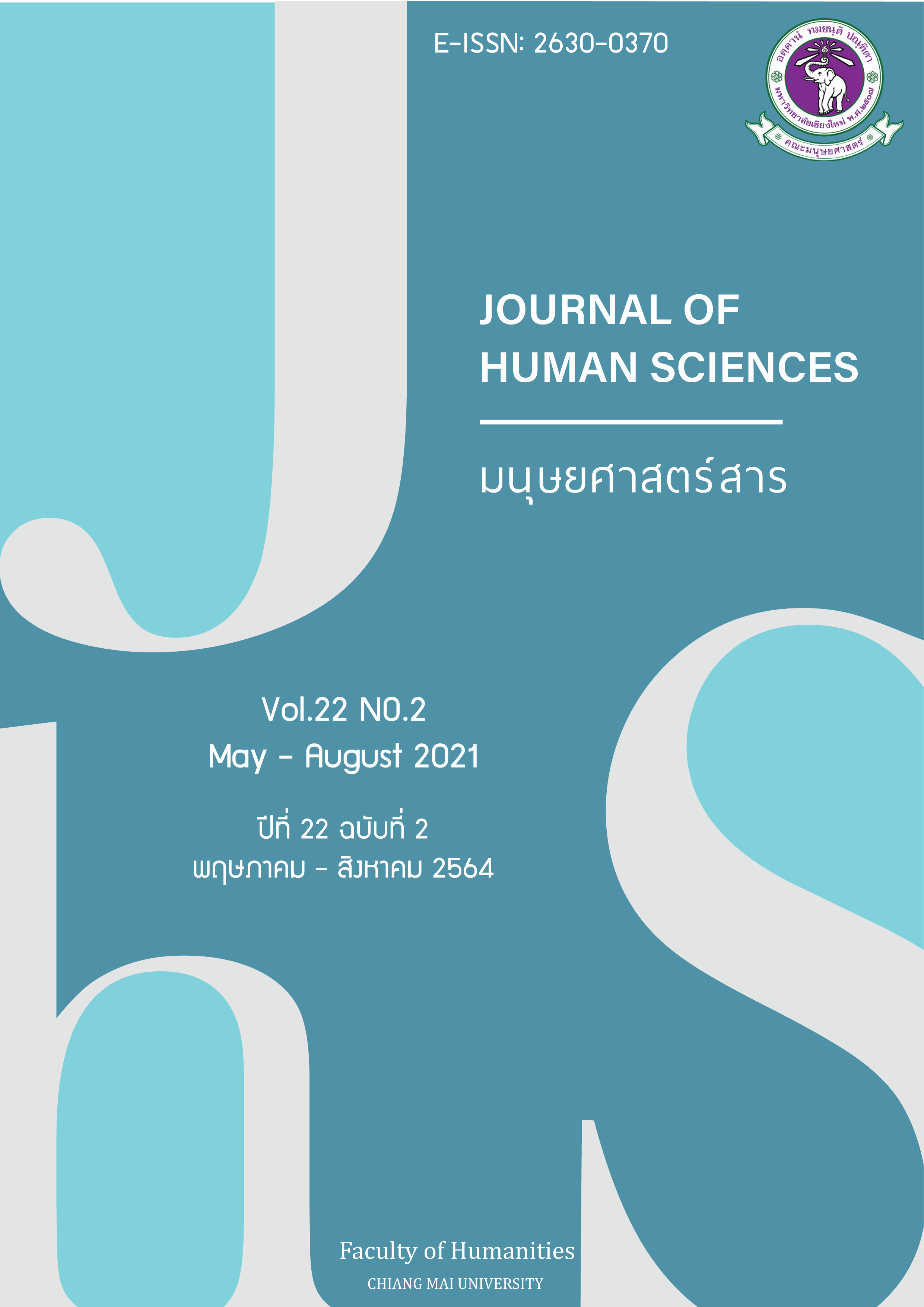การพัฒนานวัตกรรมสำหรับการสร้างเสริมสุขภาพพระสงฆ์อย่างมีส่วนร่วมของพระคิลานุปัฏฐาก
Main Article Content
บทคัดย่อ
การเปลี่ยนแปลงของสังคมส่งผลต่อวิถีการดำเนินชีวิตของพระสงฆ์ทั้งในด้านการฉันอาหาร กิจกรรมทางกายและภาวะทางจิตใจ พระคิลานุปัฏฐากมีบทบาทหน้าที่ในการช่วยสร้างเสริมสุขภาพของพระสงฆ์ตามธรรมนูญสุขภาพพระสงฆ์ปี พ.ศ. 2560 การวิจัยเชิงปฏิบัติการอย่างมีส่วนรวมมีวัตถุประสงค์เพื่อพัฒนานวัตกรรมการจัดการสร้างเสริมสุขภาพพระสงฆ์อย่างมีส่วนร่วมกับพระคิลานุปัฏฐาก โดยใช้กระบวนการทั้งสิ้น 5 ขั้นตอน เก็บรวบรวมข้อมูลจากตัวแทนพระคิลานุปัฏฐากที่ผ่านการอบรมหลักสูตรพระอาสาสมัครส่งเสริมสุขภาพจากกรมอนามัยจำนวน 78 รูปใน 11 จังหวัดภาคเหนือ ได้แก่ จังหวัดแพร่ น่าน พะเยา เชียงราย เชียงใหม่ ลำพูน ลำปาง แม่ฮ่องสอน พิษณุโลก สุโขทัย อุตรดิตถ์ ใช้เวลาในการเก็บรวบรวมข้อมูลทั้งสิ้น 4 เดือน ผลการวิจัยพบว่าคุณลักษณะของนวัตกรรมที่เหมาะสมกับพระสงฆ์ประกอบด้วยสื่อ 4 ประเภท ได้แก่ 1. แอพลิเคชั่นจักรยานธรรม 2. เพลงแหล่ 3.มิวสิควิดีโออายุยั่งยืนยาว ขับร้องเพลงแหล่โดยทศพล หิมพานต์ และ 4. คลิปวิดีโอชุดตู้ยาออนไลน์ โดยใช้ชื่อรวมของนวัตกรรม คือ สมาร์ทมังค์ นวัตกรรมนี้เป็นผลผลิตที่ได้จากการมีส่วนร่วมในการคิด ออกแบบ พัฒนาและทดลองทดสอบร่วมกันระหว่างพระสงฆ์ นักวิศวกรรมศาสตร์ นักสื่อสาร วิทยาศาสตร์สุขภาพและแพทยศาสตร์ และทดลองใช้จนได้พระสงฆ์ที่มีการเปลี่ยนแปลงในของน้ำหนักตัวของพระสงฆ์
Article Details
เอกสารอ้างอิง
Boonnoon, K. (2013). Social Innovation: Knowledge to Society for Sustainable Development. Journal of Social Academic., 10(Special issue). 245 – 262.
Chatchawarat, P. (2010). Factors Affecting Health Behaviors of Monks in Amphoe Mueang Payao Province. Phayao: Boromarajonani College of Nursing.
Dhammchito, W. (2017). Caring for a sick monk in a hospital. N.P.: Yanapawan.
Dro, I., & Therace, A. (2011). Empowering people, driving change. Luxembourg: The European Union.
Fogg, B. J. (2003). Persuasive computing: technologies designed to change attitudes and behaviors. San Francisco: Elsevier Science.
Hendriksen, I. (1996). The Effect of Commuter Cycling on Physical Performance and on Coronary Heart Disease Risk Factors. Amsterdam: Free University.
Jongsuksomsakul, P., & Riyamongkol, P. (2020). A Participatory Action Research Development with Monks Who are Caregivers in Potential Health Promotion Innovation Management. Funded by Thailand Science Research and Innovation (TSRI).
Kamchanam, M. (2009). Health care behavior of monks in Muang District, Nakhon Pathom Province. (Thesis: Master of Arts, Nakhon Pathom: Silpakorn University)
Khamjaiboon, M. (2017). The Self-Care Management of Buddha Monks with Type 2 Diabetes Mellitus at Diabetes Clinic in Priest Hospital. Journal of the Department of Medical Service, 42(2). 68-75.
Khampirapano, S. (2018). Research Buddhism into Innovation 4.0. In the College of Buddhism, Panyasri Dhavaravati and Buddhist Research Institute The 1st National Academic Conference "Buddhism and the Decade of Sustainable Development" (p.p. 119-126). Nakhon Pathom: Panyasri Dvaravati Buddhist Sangha College of Buddhism, Mahachulalongkornrajavidyalaya University.
Natthaphon, C., Kuutayakorn, P., & Wisayanan, N. (2018). Optimization for the development of life: processes and practices. Panithan Journal: Academic Journal of Philosophy and Religion, 14(1). 55-84.
Neumeier, S. (2017). Social innovation in rural development: identifying the key factors of success. Geographical Journal, 183. 34-46. doi: https://doi.org/10.1111/geoj.12180
Office of the National Health Commission [NHCO]. (2017). National Sangha Health Statute.
Retrieved From http://203.157.7.98/et/fileupload_doc/2018-02-15-3-18-2700631.pdf
Onto, P., Rudtanasudjatum, K., Tanvatanakul, V., & Sangjun, S. (2018). Web Application “SUKPRA” for The Monk Self Care in 4.0 Society. (Master of Arts Program in Peace Studies Mahachulalongkornrajavidyalaya University)
Parinyano (Jantapaso), P. A., Chimhad, P., & Nuthongkaew, K. (2020). THE GUIDELINES FOR MANAGMENT THE HEALTH OF MONKS – NOVICES IN MUEANG DISTRICT SONGKHLA PROVINCE. Journal of MCU Nakhondhat, 7(4). 46-57.
Phrakruyanapetcharat (Tewin Piyatussi). (2014). Approach Strategies of Buddhist Propagation. Journal of MCU Peace Studies, 2(2). 80-93.
Rakkanto, S., Kongkhuntod, A., & Kanchana, S. (2008). Behaviors of Self-Care of Monks in the Upper Southern Region. (Research Report, Mahachulalongkornrajavidyalaya University)
Rerkluenrit J, Ngensod J, Wihok K., & et al. (2010). Factors Predicting Health-Promoting Behaviors among Buddhist Monks in Nakhonnayok Province, Thailand. Thai Pharmaceutical and Health Science Journal, 5(4). 333-343. Retrieved from https://news.thaipbs.or.th/content/303814
Rogers., E. (1983). Diffusion of innovation. NY: The Free Press.
Silamad, S. (2014). Physical Activities for Wellness. Bangkok: Chulalongkorn University Press.
SriJaruMethiyan, C., Kenapoom, S., & Charoensiri, W. (2016). Roles of Thai monks in a globalized society. Journal of MCU Peace Studies, 4(1). 117-136.
Srimanee, S. (2013). Factors Relating to Consumption Behavior of Monks and Consumption Behavior of People in Phasi Charoen District Bangkok. Retrieve from http://rcfcd.com/wp-content/uploads/2014/01/8_ปัจจัยที่มีความสัมพันธ์ต่อพฤติกรรมการบริโภคของพระภิกษุสงฆ์.pdf.
Tansathien, P. (2007) Quality of life of monks who are ill with chronic diseases. Who came to receive medical services at Monk Hospital, Mahidol University. doi: https://doi.nrct.go.th/ListDoi/listDetail?Resolve_DOI=
ThaiPBS. (2021). The developer monk "Abbot of Wat Kruat" attached to COVID-19 death.
Vachiramethee, M. (2018). Suggest merit by QR code to protect the temple. Retrieved from https://www.banmuang.co.th/news/education/101728.


